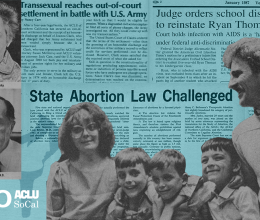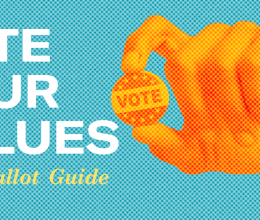
By Melissa Goodman and Ariela Migdal
The numbers tell a dismal tale.
They paint a disturbing picture of long-running, systemic gender discrimination against women directors throughout the film and television industry. Gender discrimination is illegal, yet severe disparities in directing jobs for women have remained stagnant or, by some measures, worsened over time. It is difficult to explain certain statistical trends or ignore very consistent stories of barriers from women directors as anything other than systematic bias.
Women are shut out of directing big-budget movies. This has been the case for years, and it is only getting worse. A look at top-grossing films for the last 12 years shows that only 4 percent have been directed by women. In the last two years, that paltry figure has shrunk even further to only 1.9 percent. And the television picture is not much better. Last year, a stunning 70 network shows—nearly a third--hired no women directors at all. A Directors Guild of America report released last year showed that 12 percent of television episodes were directed by white women. Women of color directed 2 percent and men of color 17 percent. The numbers for women remained static from the previous report. White men directed 69 percent of all television episodes analyzed.
By one estimate, fewer women are working as directors in American media today than there were two decades ago. In 2014, women were only 7 percent of directors on the top 250 grossing films. This number is 2 percentage points lower than it was in 1998. Some studios, networks, and production companies openly and overtly fail to hire or even consider women directors. For other companies, that failure results from an implicit bias and reliance on stereotyping about women’s aptitudes and abilities. Employers also use recruiting and hiring mechanisms like short lists of directors and word-of-mouth recruiting that have the effect of shutting women out of jobs. Even for those women who break in and get work, they consistently get less work or a different type of work than their male peers. Although there have been some internal industry efforts to increase the hiring of women, these efforts have been anemic and ineffective.
The failure to hire women directors and give them a fair opportunity to succeed in the field is a serious civil rights problem that our state and federal civil rights agencies should address. Hollywood employers don’t get a free pass to violate civil rights law. The entertainment industry often has been supportive of civil rights movements, but it hasn’t done enough to fix the glaring exclusion of women from directing jobs.
As a civil rights organization, the ACLU cares about removing systemic gender discrimination–particularly systemic gender discrimination right here in our backyard in one of Southern California’s most lucrative and culturally important industries. That is why we are asking the California Department of Fair Employment and Housing, the U.S. Equal Employment Opportunity Commission and the Office of Federal Contract Compliance Programs to address the failure to hire women directors at all levels of the film and television industry.
Specifically, the state agency should develop and file Director’s complaints and initiate an investigation into employers that have a pattern of discriminating against women directors, entities that aid or participate in employment discrimination, and talent agencies that have a pattern of failing to represent women directors, in violation of the Fair Employment and Housing Act and the Unruh Civil Rights Act. Similarly, the ACLU is asking that the U.S. Equal Employment Opportunity Commission develop and file Commissioner’s charges and investigate the systemic failure to hire women directors in violation of Title VII at all levels of the film and television industry. The federal Office of Contract Compliance Programs could be a critical player in promoting reforms because it oversees federal contractors, and a number of major studios have large federal contracts. Those contracts come with non-discrimination and affirmative action obligations, and we call on the agency to examine whether those obligations are being met.
The time has come for new solutions to this longstanding problem. More and more women (and men) in the industry are beginning to speak out about the problem. External oversight and pressure is needed to reform the entrenched attitudes and practices that have created the barriers women directors in Hollywood face.
Melissa Goodman is director of the LGBT, Gender and Reproductive Justice Project at ACLU SoCal and Ariela Migdal is senior staff attorney at the Women's Rights Project at ACLU Nationwide.







